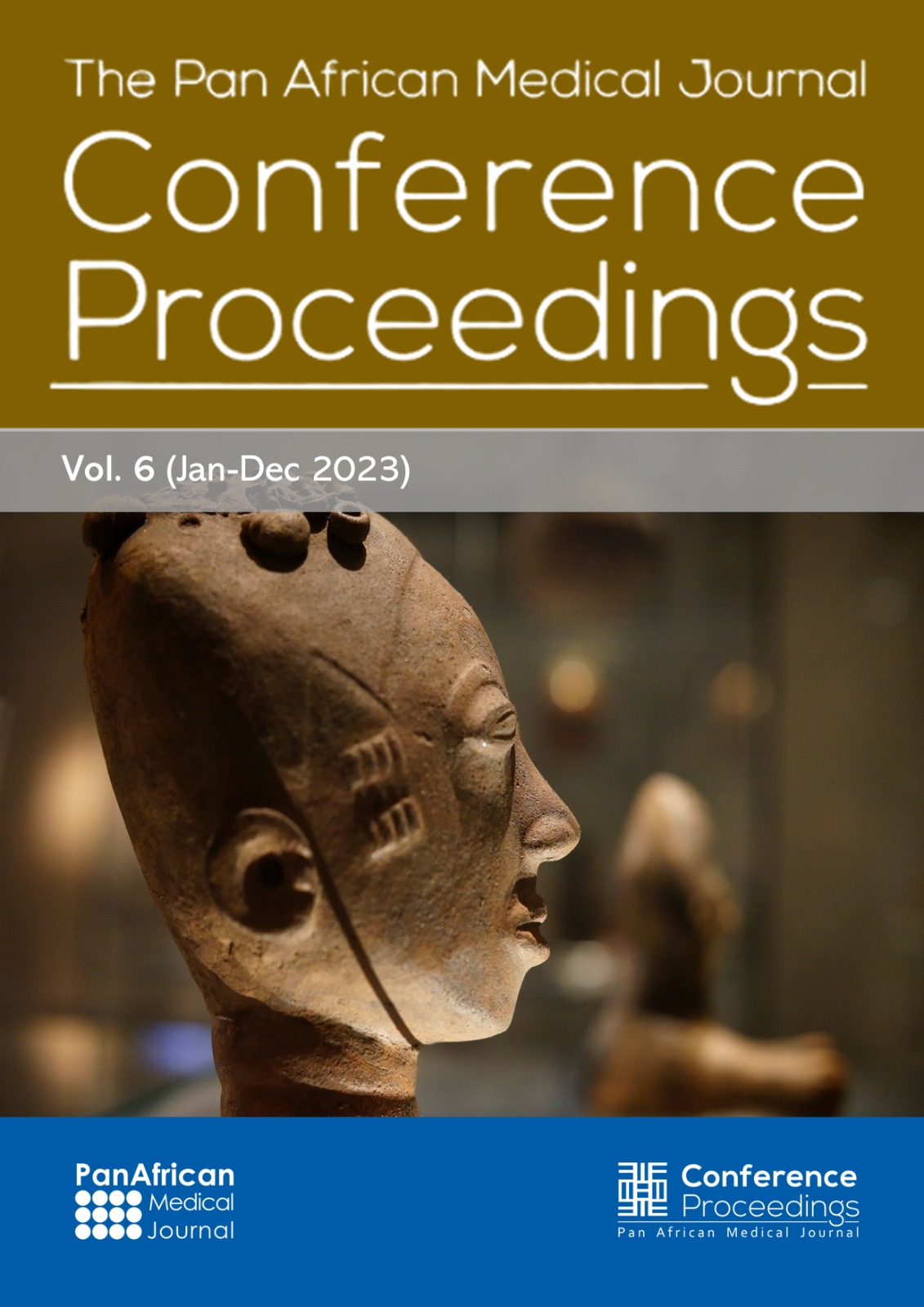Conference abstract
Knowledge and treatment behaviour of acne vulgaris among female students of University of Nigeria, Enugu campus, Enugu state, Nigeria
Pan African Medical Journal - Conference Proceedings. 2022:12(18).17
Feb 2022.
doi: 10.11604/pamj-cp.2022.12.18.1314
Archived on: 17 Feb 2022
Contact the corresponding author
Keywords: Acne vulgaris, attitude, female students, knowledge, treatment behaviour
Oral presentation
Knowledge and treatment behaviour of acne vulgaris among female students of University of Nigeria, Enugu campus, Enugu state, Nigeria
Chidinma Egbichi Israel1,&, Chisom Immaculata Ralph-Nwachukwu1, Cynthia Adaku Attah1,2
1Department of Nursing, Faculty of Health Science and Technology, University of Nigeria, Nsukka, Nigeria, 2Institute of Nursing Research Nigeria, Osogbo, Osun State, Nigeria
&Corresponding author
Introduction: acne Vulgaris is a common chronic inflammatory skin disease, with prevalence of about 80% among adolescents and adults. The study was designed to assess knowledge and treatment behaviour of acne vulgaris among female students at University of Nigeria, Enugu campus, Nigeria.
Methods: descriptive survey design was adopted for this study. Three hundred and nineteen (319) female students of University of Nigeria, Enugu Campus recruited through stratified random sampling were involved in the study. A questionnaire with a reliability coefficient of 0.80 Cronbach’s alpha was used in data collection. Ethical clearance was obtained from University of Nigeria, Teaching Hospital. Informed consent was obtained from the participants. Ethical principles of Informed consent confidentiality and anonymity were maintained in the study. Data was presented in tables and analysed using descriptive statistics of frequency, percentages, means and standard deviation; and Chi square (P Ð 0.05.) inferential statistics. IBM SPSS statistics software version 25 was used in the analysis of data.
Results/Findings: findings from the study reveal that 95.3% (304) of the respondents have good knowledge of acne vulgaris. With respect to treatment behaviour, consultation with a dermatologist was seen as very important for the management of pimples (M= 3.42±0.62), while the respondents do not consider removing acne by squeezing as necessary (M= 2.04±0.92). Majority of the respondents (86.8%) use medically approved drugs and formulations like cleansers, exfoliants, sunscreen and only 47.6% use unprocessed organic products like soap, creams and other formulation mixed without laboratory tests. The study found no statistical association between educational level and knowledge of acne vulgaris (X2=3.963, P =0.396).
Conclusion/Implications for Nursing: Based on the results of this study, it is imperative for nurse administrators to organize health campaigns on the treatment options available for acne vulgaris. Nurse researchers should also identify the barriers to recommended treatment options among female students in UNEC.
Knowledge and treatment behaviour of acne vulgaris among female students of University of Nigeria, Enugu campus, Enugu state, Nigeria
Chidinma Egbichi Israel1,&, Chisom Immaculata Ralph-Nwachukwu1, Cynthia Adaku Attah1,2
1Department of Nursing, Faculty of Health Science and Technology, University of Nigeria, Nsukka, Nigeria, 2Institute of Nursing Research Nigeria, Osogbo, Osun State, Nigeria
&Corresponding author
Introduction: acne Vulgaris is a common chronic inflammatory skin disease, with prevalence of about 80% among adolescents and adults. The study was designed to assess knowledge and treatment behaviour of acne vulgaris among female students at University of Nigeria, Enugu campus, Nigeria.
Methods: descriptive survey design was adopted for this study. Three hundred and nineteen (319) female students of University of Nigeria, Enugu Campus recruited through stratified random sampling were involved in the study. A questionnaire with a reliability coefficient of 0.80 Cronbach’s alpha was used in data collection. Ethical clearance was obtained from University of Nigeria, Teaching Hospital. Informed consent was obtained from the participants. Ethical principles of Informed consent confidentiality and anonymity were maintained in the study. Data was presented in tables and analysed using descriptive statistics of frequency, percentages, means and standard deviation; and Chi square (P Ð 0.05.) inferential statistics. IBM SPSS statistics software version 25 was used in the analysis of data.
Results/Findings: findings from the study reveal that 95.3% (304) of the respondents have good knowledge of acne vulgaris. With respect to treatment behaviour, consultation with a dermatologist was seen as very important for the management of pimples (M= 3.42±0.62), while the respondents do not consider removing acne by squeezing as necessary (M= 2.04±0.92). Majority of the respondents (86.8%) use medically approved drugs and formulations like cleansers, exfoliants, sunscreen and only 47.6% use unprocessed organic products like soap, creams and other formulation mixed without laboratory tests. The study found no statistical association between educational level and knowledge of acne vulgaris (X2=3.963, P =0.396).
Conclusion/Implications for Nursing: Based on the results of this study, it is imperative for nurse administrators to organize health campaigns on the treatment options available for acne vulgaris. Nurse researchers should also identify the barriers to recommended treatment options among female students in UNEC.








